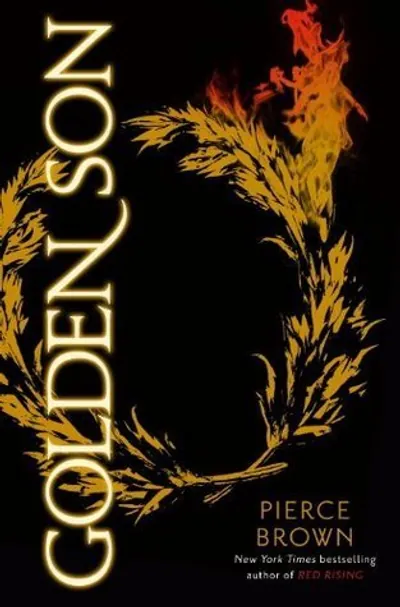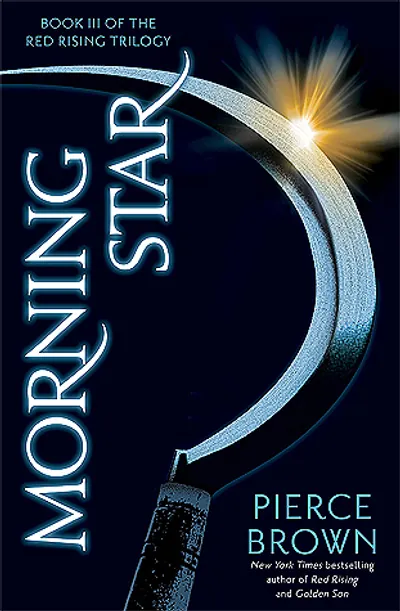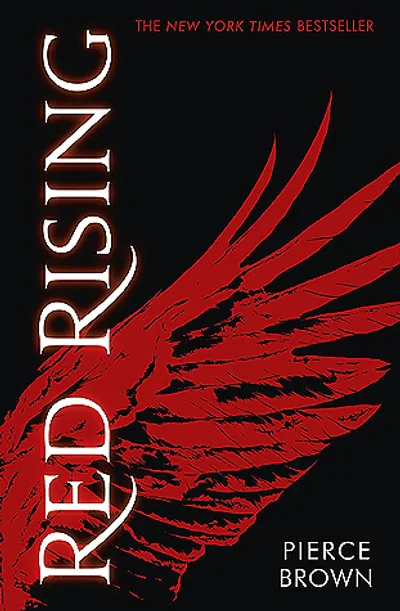Golden Son
by Pierce Brown
Reviewed by BroMantasy on March 26, 2025
Est. Reading Time: 12 min

Quick Info
Affiliate Link: Purchasing with this link helps support BroMantasy at no extra cost to you.
Author: Pierce Brown
Series: Red Rising Saga (Book 2)
Published: January 6, 2015
Rating:
ISBN-10: 0345539834
ISBN-13: 9780345539830
Golden Son by Pierce Brown
At a Glance: The Perfect Sequel That Redefines Excellence
Golden Son isn’t just above the sophomore slump. It obliterates it. It’s what happens when an author takes everything that worked in the first book and multiplies it while adding in layers of complexity that most authors would never even attempt. Pierce Brown turns Darrow from an academy revolutionary into a political mastermind of the Solar System, going from a training ground of competition to a civilizational-spanning war and never losing an ounce of the character work that made the first book so compelling.
What makes Golden Son extraordinary isn’t just its scale. It’s that every expanded aspect of it feels like it’s meant to be. The shift from Mars-bounded competition to an interplanetary politics doesn’t feel like a story artificially getting bigger just to get bigger. It feels like a logical next step for a revolution that’s always been meant to overthrow the galaxy. Darrow infiltrates the top echelons of the Gold caste as a lancer for House Augustus, playing deadly politics and setting up moves that will either free the lower castes or destroy everything he’s fought for.
This isn’t just a sequel. It’s a statement. Brown shows that science fiction can still have both intellectual complexity and emotional catharsis, that space opera can be epic and intimate, and that second books can still be better than the first.
A Universe That Breathes: Worldbuilding Perfection
Red Rising was an introduction to Brown’s universe, but Golden Son is a banquet. The transition from Mars to Luna, from station to station, to mining colonies, feels natural and naturalistic. Every setting is necessary and exposes some facet of this elaborate, stratified society that spans the Solar System.
Brown’s brilliance is how he can use geography to explore politics. Luna’s excess is in direct contrast to Mars’s industry, while the orbital engagements demonstrate the true scope of this empire’s might. Every location has its own message about power, resources, and the cost of a rigidly stratified society on several worlds.
But the true masterwork is the political worldbuilding. Brown has house politics that rival A Song of Ice and Fire in complexity while still keeping that sci-fi edge that makes this feel so fresh. The Augustan, Bellona, and Sovereign aren’t just “sides” in a war, they’re ideologies of power, progress, and humanity’s place in the universe.
Technology deserves a special callout. GravBoots aren’t just cool gadgets, they’re an actual 3D combat that feels otherworldly. Razors aren’t just weapons, they’re an extension of their wielders’ characters and combat styles. Even the massive ships feel like characters in their own right with specific capabilities that define their battles.
Character Development That Cuts Deep
Darrow’s transformation from insurgent to military leader to politician is one of the best character arcs in modern sci-fi, and what makes it so great is that Brown never lets us forget the price. Each step forward comes at the cost of part of his old identity, which makes the struggle real. There’s a constant sense that he’s becoming the very thing he’s trying to destroy.
The rest of the cast explodes with complexity. Mustang goes from potential love interest to political operator with her own ambitions. Sevro shows layers that make his loyalty both tender and terrifying. Roque demonstrates the flawed nobility that makes betrayal inevitable rather than surprising. Even villains like the Sovereign and Victra are fully formed people with reasons we can understand rather than check-box obstacles.
Brown’s crowning achievement is making every relationship feel earned. The ones formed through shared battle feel different from the ones formed through political calculus, and both feel different from those formed through understanding. When these relationships break—and they will—the devastation is crushing because we’ve seen every moment that made them.
The psychological depth never sacrifices the action. These people face impossible choices in impossible situations, and their responses reveal the true shape of their characters. Darrow’s fight to hold onto his ideals while playing the Gold political game becomes internal conflict that manifests externally in ways that feel fated and surprising.
Relentless Momentum: Pacing Perfection
Golden Son does something rare: it maintains breakneck pacing over multiple plot threads without feeling rushed or losing track of its narrative. Brown blends space battles, political maneuvering, personal betrayals, and military planning into one single forward momentum that never lets up.
The structure is brilliant. Every major action sequence naturally follows from the political situation, while every quiet character scene lays the groundwork for the future. There’s no dead air here: every scene has a purpose, advancing the plot, deepening the characters, and building toward the inevitable firestorm.
The various types of conflicts keep the pace from becoming dull. Just when you settle into the rhythm of political maneuvering, there’s a space battle. Just when you think you understand the military situation, personal betrayals undermine everything. Just when you think the alliances are set, hidden agendas undermine the entire situation.
Brown’s understanding of tension is particularly noteworthy. He knows when to offer respite and when to keep twisting the knife. The result is a reading experience that feels like being trapped in a contained avalanche—everything’s happening as it should, but you’re still out of breath from the ride.
Between the Sheets: Character Connection Over Romance
The spice rating remains an appropriately lowly 🌶️ (1.0), as romantic intrigue is a tool of character development rather than reader titillation. Darrow’s romantic entanglements feel earned because they arise out of shared experience and mutual respect rather than the manufactured romantic conflict so often seen in other media.
The emotional moments that do arise don’t detract from the story. When characters find the time to have a moment of intimacy, it feels earned, built on the connections we’ve seen and the stakes that have been laid out. These aren’t romance novel scenes—they’re human moments that remind us of what’s on the line beyond the politics and the war.
The lack of romantic conflict also allows Brown to focus on the true core of the story: the connections that matter—loyalty, betrayal, the cost of the commitments we make when we’re living a lie. The result is a story that’s emotionally fulfilling without feeling like a different genre’s been tacked on.
Bro Reading Comfort: Space Opera Excellence
With a comfort rating of 😳 (1.0), Golden Son is perfectly suited for public reading. The focus remains squarely on military strategy, political maneuvering, and space combat—all traditionally male-dominated genres that translate well to any reading environment.
The cover art maintains the series’ symbolic approach, and the content delivers exactly what the space opera genre promises: grand scope, tactical complexity, and heroic characters facing impossible odds. Any romantic elements are so well-integrated that they enhance rather than dominate the narrative.
This is science fiction written for everyone but crafted with particular attention to what makes military sci-fi and space opera compelling: strategic thinking, loyalty under pressure, and the cost of leadership in wartime.
Darkness Factor: The Price of Revolution
The darkness rating of 💀💀💀💀💀 (5.0) is earned by Brown’s refusal to whitewash what revolution truly costs. The violence of the Institute is tightly controlled, a set of one-on-one duels that do not diminish their participants; but the war in Golden Son is conducted on a Solar System scale, where decisions make millions dead and betrayals crack decades-long friendships.
The difference between gratuitous and effective darkness is that the former is applied as a gimmick, while the latter is thematic. Every death matters. Every betrayal has consequences. Every victory is weighed against the cost it demanded, and you wonder if it was worth it. Brown never makes violence casual or commonplace; every death feels emotionally significant and only builds in tension as the story progresses.
The psychological darkness cuts even deeper. Watching Darrow struggle to justify his own moral compromises, watching friends whose loyalties are ripped apart by circumstances outside their control, watching even the finest and most compassionate people gradually become the worst sort of villains through their actions. That is darkness that emerges from the story and characters, not inflicted for shock value.
The end result is a story that earns its darkness because it has to. This isn’t grimdark because grimdark. This is a brutal story because it is the truth.
Book Battlefield: Setting the Gold Standard
Golden Son is not just a space opera that stands on its own two legs; it is a space opera that redefines what that term can even mean. Where Dune paved the way for political complexities in sci-fi and The Expanse brought physics to bear in space battles, Brown manages to accomplish both of those while also imbuing the story with an emotional access that makes its political complexities personal.
In this regard, it reminds me of the best work of A Song of Ice and Fire. Like ASOIF, Golden Son manages political complexity without sacrificing character development, maintains multiple threads of plot without losing focus, and has twists and turns that are shocking but in retrospect feel inevitable. But in a science fiction setting that adds in technological considerations in every political calculation.
What sets Golden Son apart from its contemporaries is how easily all of these elements intermingle. The space battles feel like the natural extension of the political machinations. The personal relationships propel the greater plot without feeling forced. The technology enhances rather than obfuscates the human drama.
This is a sequel that not only meets the promise of its predecessors, but raises new expectations for what science fiction can do.
Why Golden Son Earns Five Stars
We all know the score on this one: Golden Son gets a perfect 5.0 because it accomplishes something truly remarkable in genre fiction. It takes every element that made its predecessor successful and builds on it. Each element, every single one, gets more complex, more interesting. Not just good, but amazing.
The writing is better than ever. Brown’s prose is sharper, his dialogue snappier, more tense. His action sequences more exacting, more tense, more emotional. His politics more complex and easier to understand at the same time.
But technical skill alone doesn’t warrant a five star rating. What makes Golden Son special is how it manages to be both epic and intimate. The epic battles feel more intimate because we know what they mean to each individual character. The politics matter because they decide the fate of people we care about. The betrayals devastate because we know every moment that forged the relationship that’s now broken.
Character development reaches a level that most authors don’t even attempt. Darrow’s development feels like a classic case of good change for the worse. The supporting characters keep their own agency, but also help drive the story. Even the antagonists feel like full characters, with their own goals and reasoning.
But above all else, Golden Son delivers on its promises, while setting up even bigger stakes. It resolves the immediate issues while laying down the tracks for the whole series. It gives you emotional satisfaction, while also giving you the next steps. It feels complete, but still very much part of a larger picture.
Should You Bother?
For Sci-Fi Fans: You’re going to want to read this one. Golden Son shows what space opera can do when every element works in perfect unison. The scale, the politics, the tech, and the characters all support a unified vision that defines the genre.
For Character-Driven Readers: Don’t be fooled by the space battles. This is a story about people under impossible pressure making impossible choices. The emotional stakes drive every plot point, and the character growth feels real and earned.
For Political Thriller Fans: The house politics, shifting allegiances, and diplomatic machinations form a political thriller that happens to take place in space rather than a space opera with political shenanigans added.
For Everyone Looking for Excellence: Sometimes a book transcends genre to become simply great literature. Golden Son is one of those books.
Final BroMantasy Verdict
Golden Son earns its perfect 5.0 rating by doing something that most authors never accomplish: It improves on an already outstanding work while establishing itself as essential reading in its own right. This isn’t just one of the best sequels ever written. It’s one of the best science fiction novels ever written, period.
Pierce Brown’s growth as a writer is evident when comparing this to Red Rising. Every aspect of the craft improves: the prose shines with confidence, the plotting achieves architectural perfection, the character work reaches an emotional depth, and the thematic exploration probes questions that transcend the science fiction genre.
What makes Golden Son truly special is that it earns every moment of its excellence. Nothing feels gratuitous or unearned. Every emotional moment lands because he’s established stakes that matter. Every plot twist surprises while feeling inevitable because he’s planted the seeds correctly. Every character moment resonates because he’s built people we care about.
The book succeeds as both intimate character study and epic space opera, as both political thriller and military science fiction, as both philosophical exploration and pure entertainment. That’s what separates good books from great books, and great books from perfect books.
Golden Son proves that genre fiction can accomplish anything that so-called literary fiction can accomplish while providing the thrills and scale that only science fiction can provide. It’s a book that works on every level—technical, emotional, intellectual, and visceral.
This is why Golden Son earns one of the few perfect ratings on this site. It doesn’t just excel in its genre—it transcends genre limitations to become simply essential reading. If you read one space opera in your lifetime, make it this one. If you read a hundred space operas in your lifetime, this one will still stand apart.
The series was already good. Golden Son makes it legendary.
Rating Dashboard
Related Reviews
Frequently Asked Questions
Is this book part of a series?
Yes, this is book 2 in the Red Rising Saga series.
How spicy is the romance?
We rate the spice level at 🌶️ (1/5). Brief romantic elements serving character development rather than central focus
How uncomfortable is it to read in public?
We rate the public reading discomfort level at 😳 (1/5). Action-focused narrative with minimal content concerns for public reading
How dark are the themes in this book?
We rate the darkness level at 💀💀💀💀💀 (5/5). Unrelenting brutality, mass casualties, shocking betrayals, and devastating personal losses
What age group is this book for?
This book is generally recommended for adult readers due to its mature themes. We recommend checking specific content warnings if you are sensitive to certain topics.

